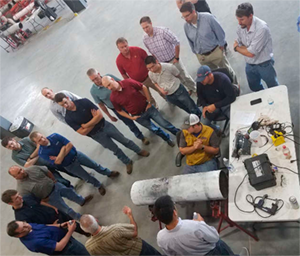
Pipeline Defects Repair Workshop
Led by Sergio Limón and Michael J. Rosenfeld
September 27-28, 2023 | PRCI’s Technology Development Center | Houston
Register before September 13, 2023 and save $100!
| Day 1 | |
| 9am-5pm CDT | Course |
| Day 2 | |
| 9am-5pm CDT | Course |
This course will be held at
PRCI’s Technology Development Center
in Houston.

Imperfections and defects may be found in pipelines associated with the inherent steel making process, line pipe manufacturing, pipeline construction or introduced during its operation. Not all imperfections and defects are injurious to the safe operation of pipelines and established engineering methods exist for performing engineering assessments to make such determination. Those defects that are injurious require repair. The operator must then choose from a wide selection of repair methods considering regulations, industry guidance, repair effectiveness, and practical details.
To demonstrate existing and new Repair technologies and their application for specific defects uncovered during the defect assessment and NDE phases of pipeline rehabilitation.
Complete course presentation material will be available as a PDF download prior to the course.
Upon completion of the course, participants will be eligible to receive 1.2 Continuing Education Units.
This course will cover assessment methods and repair options for the most common pipeline imperfections and defects. PHMSA repair regulations and industry Codes ASME B31.8 and B31.4 associated with pipeline repairs will be discussed. The course will address pre-NDE activities, field NDE defect evaluation, engineering assessment, repair criteria, repair selection and installation. Hands-on NDE and repair installation demonstration are part of the workshop.
Led by Sergio Limon and Mike Rosenfeld, you will learn:
The course is intended for practicing pipeline professionals who are involved with the field defect evaluation, engineering assessment, and onsite repair preparation and installation activities; these include pipeline engineers and operators, bell hole support specialists, excavation inspectors, NDE service providers, repair manufacturers, ILI analysts and field support team.